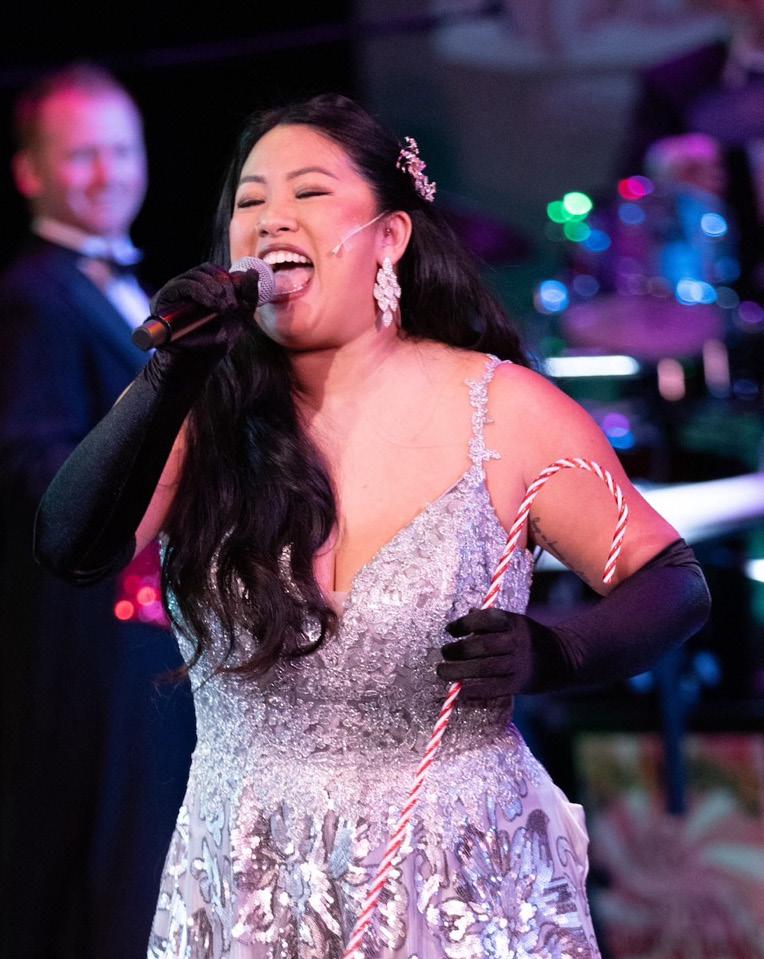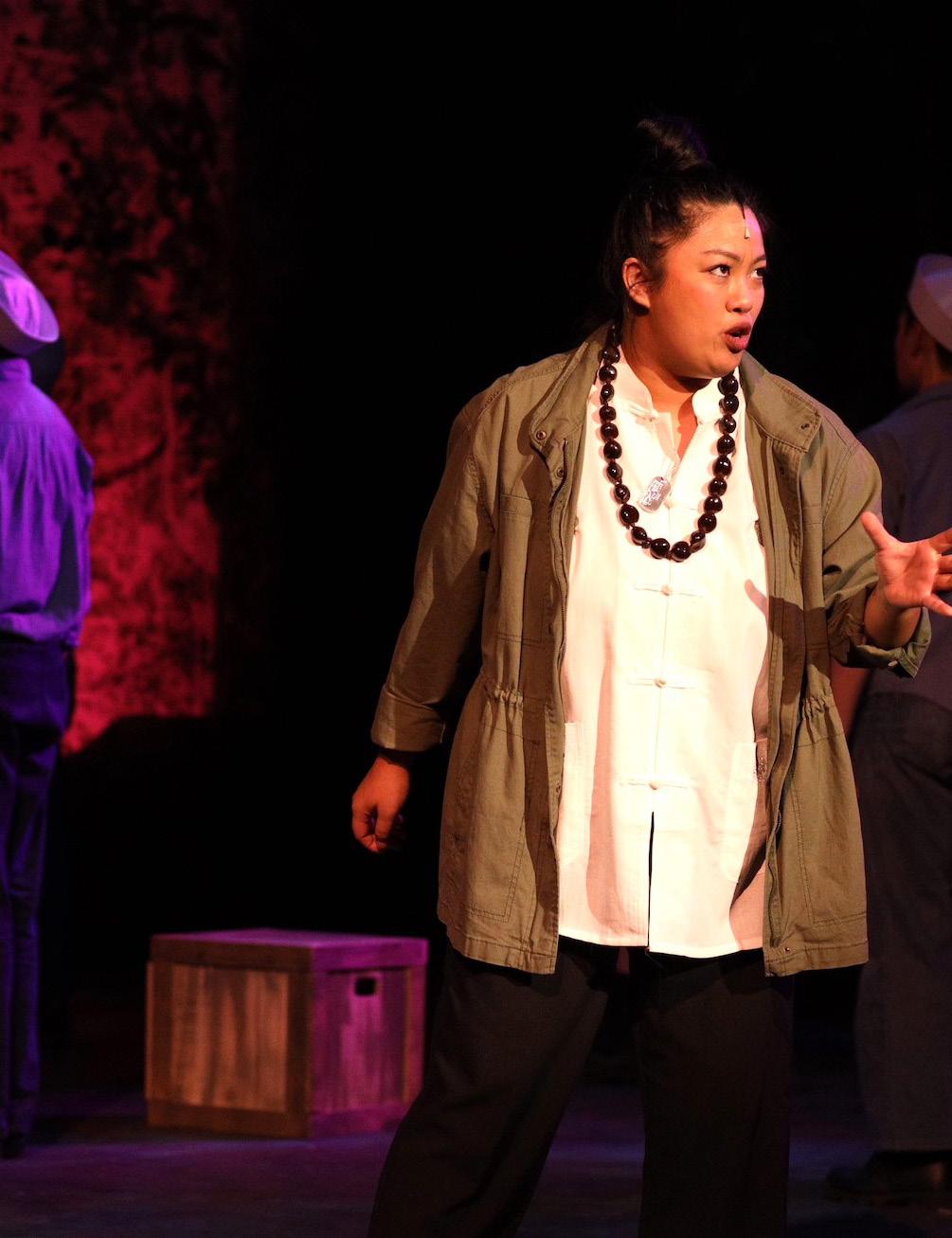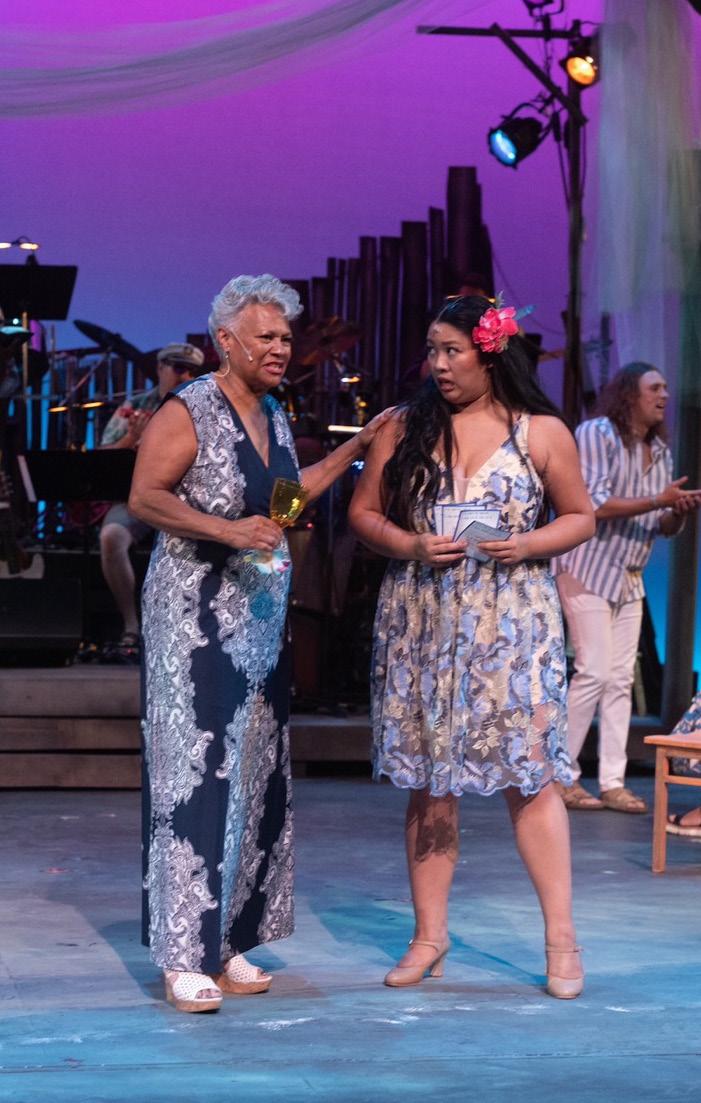
10 minute read
Opera, Representation and Education
BY LAUREN FILIPPINI (ALPHA CHI, BUTLER UNIVERSITY), MARKETING AND COMMUNICATIONS MANAGER
When Melody Chang (Omega, Washington State University) decided to study opera in college, she pursued more than just opportunities to share her mezzo-soprano voice on stage. She also invested time in learning all other aspects of putting on a show – stage management, costumes, administration and more.
Today, Melody combines her well-rounded understanding of opera with her belief in the power of education and her commitment to advocacy. As the executive director of the Asian Opera Alliance, she is leading the charge to increase Asian representation in opera and address stereotypes of roles and shows. In that capacity and several other professional and volunteer roles, Melody is putting action behind her conviction that education can change the world.

THE ART OF OPERA
Today, Melody is a leader in the arts world, but she would never have guessed that’s where her path would take her. Raised by an engineer and an accountant, Melody was a competitive ice skater and soccer player as a child, and while she learned to play an instrument in fourth grade, she says her family wasn’t musically inclined.
“I was supposed to be the next engineer. I had gone to robotics camp growing up and gone to my dad’s office playing around with the hardware,” she says. Melody hadn’t done much singing until college, when she joined the chorus for an opera. “I called him after my first semester and said, ‘Dad, I’m switching my major to opera.” Her parents were surprised but supportive. Melody was all in, finding that the art was a new challenge in which she thrived. She says the inspiration for her passion was “the richness of everything that goes into an opera, how textured and layered things are. And then there’s the whole aspect of singing un-mic’d over an orchestra.”
In opera, singers and orchestras perform for the entire length of the show. Melody explains that opera singers must be in incredible shape to make their voices heard over instruments. She says, “All of that together fascinated me, and I found that I loved singing on stage – not necessarily as the star, but I loved just being around that.”
For those Alpha Chi Omegas in similar college programs, Melody shares this advice: “Learn everything you can. Take every opportunity. Make sure to protect your time and take care of yourself – but say ‘yes’ to helping with lighting design. Say ‘yes’ to helping unload things. You’re never too big to help with the small tasks. The more you do that, the more you will learn about the ins and outs of this industry.”
It’s what Melody did during college. Though she loved performing, she knew she didn’t want to sing as a fulltime career, so she threw herself into studying every aspect of putting an opera together. She brought those skills to her professional life, working right out of college for the Best of Broadway series in their national tours in Spokane, Washington. Melody loves the teamwork aspect of theater, whether she’s performing or behind the scenes. She explains that the work isn’t glamorous, but it’s worth it: “People see all the galas and the pictures, but really, it all runs on a couple of very overcaffeinated people taking naps in the corner on the couches.”
Following that first job were positions at various arts and media organizations, primarily in marketing. However, when COVID-19 wreaked havoc on the arts industry, Melody had to get creative. At her marketing job with Inland Northwest Opera, she brought out all her skills – including her penchant for “taking things apart and putting them back together” that started in childhood – to build a traveling opera truck! Melody had taken up a hobby of rebuilding cars during the pandemic, so when her boss came to her with the idea to take opera on the road, she got to work.
“We bought a 16-foot box truck and started redoing the floor. … We tuned up the engine and had a stage created custom for it,” Melody explains. “And then we just set out doing public performances of our education programs and recitals.”
It was just the beginning of her creativity. Melody soon had the chance to bring her toolbox of skills to another organization, setting her on a path to make change.
ADVOCATING FOR REPRESENTATION
In May 2021, a group of Asian-identified opera professionals came together to form the Asian Opera Alliance. The Asian Opera Alliance exists “to uplift one another and to advocate for greater Asian representation in opera, while striving for broader equity.” Melody serves as the organization’s executive director and works hand in hand with opera companies to provide consultation on shows, particularly those like Puccini’s Madama Butterfly, to accurately and respectfully portray Asian characters instead of falling into long-performed stereotypes.
“Our idea is we want to call in, not call out,” she says. Melody values the collaboration between the Asian Opera Alliance and opera companies that have invited her to share resources and expertise. She advises on all parts of the production, from performers to costume design to donor engagement, always keeping in mind the needs of current and future Asian opera professionals and the industry as a whole. “No detail is too small when it comes to making sure artists feel safe.”
For example, for a recent run of Madama Butterfly that Melody was consulting on, it was the first time that the actress playing the title role (who had played it countless times before) had kimono padding under her kimono costume, making it more authentic. Choreography for the chorus members also avoided unnecessary shuffling, bowing and giggling that perpetuates stereotypes of Asian women.
“It doesn’t come from a place of hatred; it comes from years and years of media reinforcing these stereotypical images of Asian people,” Melody says. “And the fact that these singers, who have done this all over the world in some of the biggest houses, that this is the first time [they are performing in a culturally sensitive version of the show], it makes me sad, but also very happy that we’re making the change now.”
Melody brought this experience to her recent performance in the role of Bloody Mary, a Tonkinese vendor in Rogers and Hammerstein’s South Pacific, with the Spokane Valley Summer Theatre (SVST). Melody works as the marketing and communications director for SVST and the Idaho Central Spokane Valley Performing Arts Center (ICSVPAC) that it is building, and she performs with the company when she can.

“It wasn’t a role I ever wanted to play because it was very stereotypical, but we did dramaturgical work and additional research on how to portray her in a nonracist manner,” Melody says. “We educated the cast on where in the South Pacific this would have taken place and actual cultural customs that would have been important to her. … I just loved that and really getting to sink my teeth into her.”
The Asian Opera Alliance also offers master classes and mentorship to its members, hosts resources and a database of Asian opera professionals, and publishes data on the demographics of casting in the major opera companies.
Melody explains, “In this industry, it’s really tough to put yourself out there. You are your own instrument. So it’s really important to see ourselves reflected, and it’s really important for other people to know that Asian opera singers are a big deal. Just the fact that we look different doesn’t mean we can’t do the job.”
All of this supports the organization’s mission of advocating for representation of Asian-identifying performers in all roles and across industry positions – and in turn, moving the opera industry toward a more inclusive and equitable experience for all. “It’s about how your company as a whole treats artists and people, and it’s not just Asian people,” Moldy says. “We [the Asian Opera Alliance] go from the lens of trying to make it better for ourselves, but in turn making it better for everyone else.”

EDUCATION AS THE KEY
Melody’s work underscores one of her core beliefs: the power of education.
“I believe education is the solution to all the world’s problems,” Melody says. She is the former board president of Communities in Schools, an organization dedicated to providing support to students to empower them to stay in school. She led the nonprofit after the COVID-19 pandemic, helping students get access to community resources so they wouldn’t fall behind academically. Access to and equity in education are cornerstones of what she does.
In her current professional roles with the SVST and ICSVPAC, Melody is proud of her work to help close the gap between local theater and national tours. The plan is for the performing arts center to have a yearround conservatory to provide education and training. “They are really going to change a lot of lives with this performing arts center,” Melody says.
Melody’s commitment to increasing access to arts education is also reflected in the scholarship she started in 2021 for first-generation BIPOC music or theater students to purchase materials to pursue their art, such as repertoire books and recital dresses, which are not typically covered by traditional scholarships.
When it comes to arts and theater education in particular, Melody says the benefits extend throughout life. Kids get experience accessing and processing through emotions as they act out a character. “I feel it’s a little practice run for when you have to work through it yourself. It gives you emotional intelligence,” Melody says. “You live your whole life as yourself. But in theater, even if you’re just in the chorus, even if you’re a tree, at least you get to play a tree, and you understand from a tree’s point of view.”
And an arts education is not just for those with aspirations to perform as a career. Melody says that although she’s seen the SVST act as a “springboard for young arts to really hone their craft and get where they want to go in this industry … not all of those kids are going to go on to be on Broadway. But they’re going to be given skills like public speaking.”
An introvert herself, Melody gained similar skills from her theater work – and from Alpha Chi Omega! She says her ability to keep a conversation going, to be charismatic and to present herself all came from sorority recruitment.
From helping her feel less alone on campus to making lifelong friends and finding community in alumna life, Alpha Chi Omega has provided Melody a network of support. “The alumnae group puts together a group of sisters to come see my shows, everything I’m in. The ongoing support is really lifelong.”
As an advocate, performer, theater professional and more, Melody is making change in the opera and theater industries – and she’s excited to see where she goes from here. “It’s the little things, like remembering how people respond, remembering how artists feel. No matter what I do, my goal is to make sure artists feel safe,” she says. “I’m very optimistic.”



